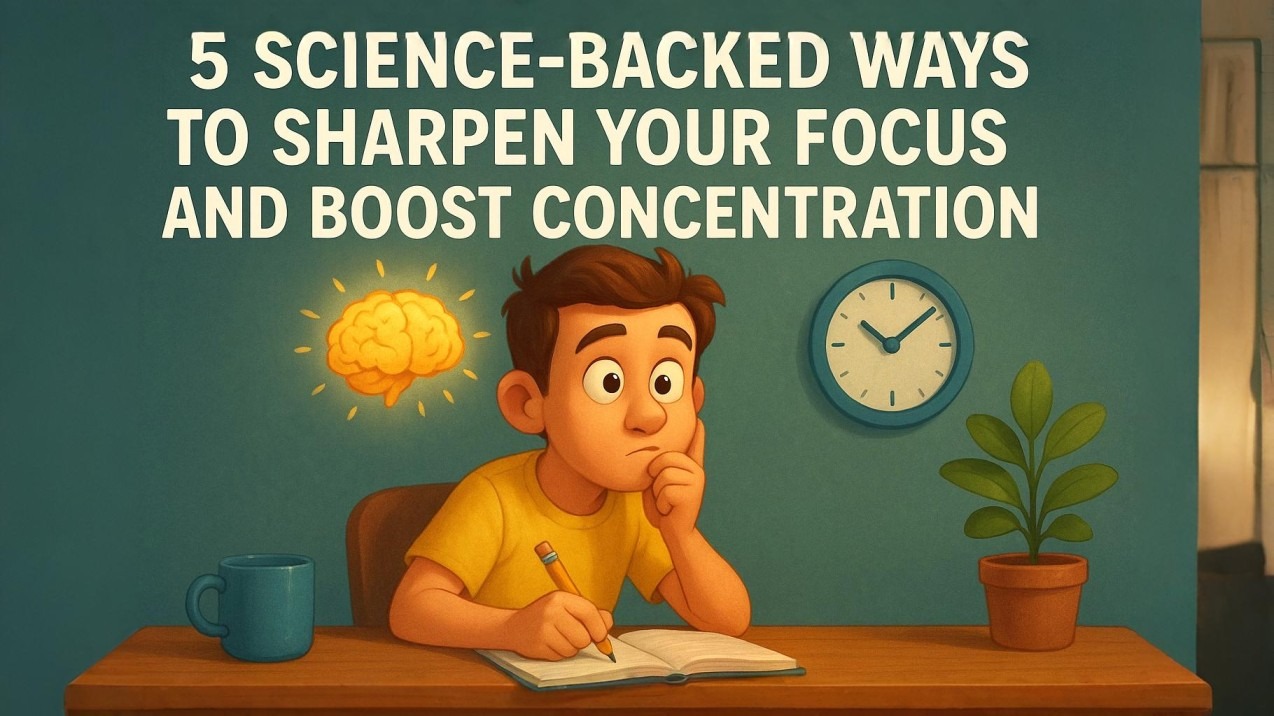Loading advertisement...
05-08-2025

Struggling to stay focused while studying or working? You're not alone. In today's distraction-filled world, improving your concentration is more important than ever. Thankfully, science has uncovered effective habits that can train your brain to focus better. Here are five of the most reliable, evidence-based methods:
When you work continuously without rest, your brain becomes mentally drained.
What science says:
The brain’s ability to maintain consistent attention drops after extended periods of focus. Researchers suggest that brief mental breaks can actually help reset and improve focus.
Try this:
Use the Pomodoro Technique (25 minutes of focused work, followed by a 5-minute break).
After four cycles, take a longer 15–30 minute rest.
During breaks, step away from screens and do something relaxing like stretching or taking a walk.
Why it works:
Breaks reduce cognitive fatigue, improve motivation, and give your brain time to consolidate information.
Lack of sleep is one of the biggest enemies of focus and productivity.
🔬 What science says:
Sleep helps your brain remove toxins, process information, and strengthen memory. Sleep-deprived individuals show reduced alertness, slower processing speeds, and impaired decision-making.
🛠 Try this:
Aim for 7–9 hours of sleep per night.
Maintain a consistent bedtime.
Avoid caffeine late in the day and stay off screens before bed.
💡 Why it works:
Sleep allows your brain to "recharge," enhancing attention, creativity, and cognitive function.
Mindfulness helps your brain stay anchored in the present.
🔬 What science says:
Studies show that mindfulness meditation increases grey matter density in areas of the brain linked to focus and emotion regulation. It also reduces stress and helps minimize distractions.
🛠 Try this:
Start with 5–10 minutes of meditation each morning.
Use free apps like Headspace or Insight Timer for guided sessions.
Throughout the day, take “mindful pauses” to check in with your breath and surroundings.
💡 Why it works:
Mindfulness trains the brain to notice and gently redirect wandering thoughts, improving sustained attention over time.
What you eat directly affects how well your brain functions.
🔬 What science says:
Nutrients like omega-3 fatty acids, antioxidants, and vitamins B, D, and E are essential for brain health. Dehydration or junk food can impair mental clarity and focus.
🛠 Try this:
Include leafy greens, eggs, nuts, berries, oily fish, and whole grains in your meals.
Avoid excess sugar and processed snacks.
Drink at least 6–8 glasses of water daily.
💡 Why it works:
A well-nourished brain is more alert, processes information faster, and is less prone to fatigue and distraction.
Exercise isn’t just for fitness—it supercharges your brain too.
🔬 What science says:
Physical activity boosts blood flow to the brain, promotes the release of mood-boosting chemicals, and even stimulates neurogenesis (growth of new brain cells).
🛠 Try this:
Do at least 30 minutes of moderate exercise (like walking, jogging, cycling, or yoga) 3–5 days a week.
Even a 10–20 minute walk before work or study sessions can improve focus.
💡 Why it works:
Exercise enhances memory, improves mood, reduces anxiety, and sharpens attention by improving brain plasticity.
You don’t need superpowers to concentrate better—just small, smart habits. By combining sleep, breaks, nutrition, movement, and mindfulness, you can build mental strength and focus like never before.
Start with one tip today and watch how your focus transforms over time.
✅ Stay connected with Skool Guru for more educational tips, exam strategies, and academic guidance.
📞 Need help? Contact our mentors today!
Visit: www.skoolguru.in